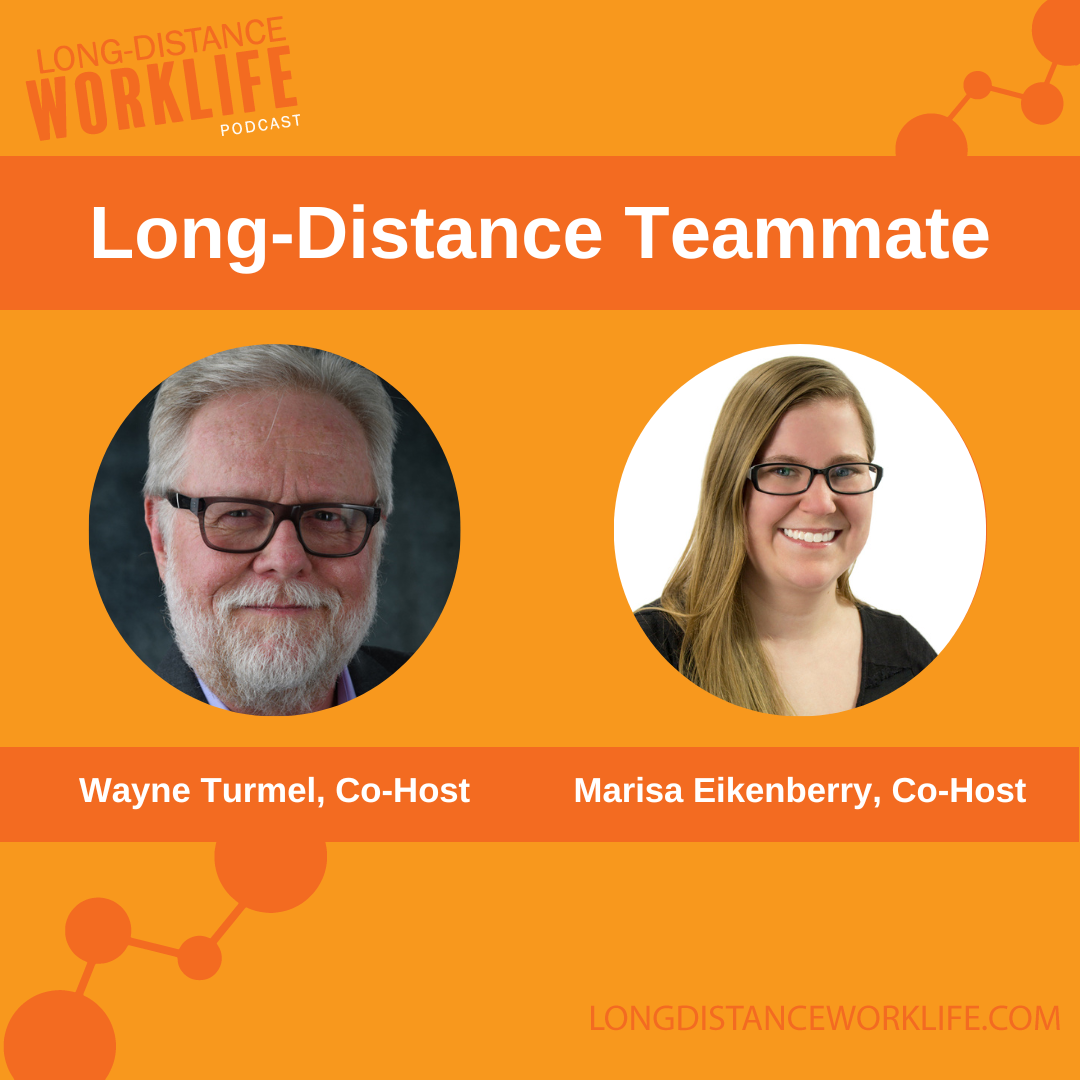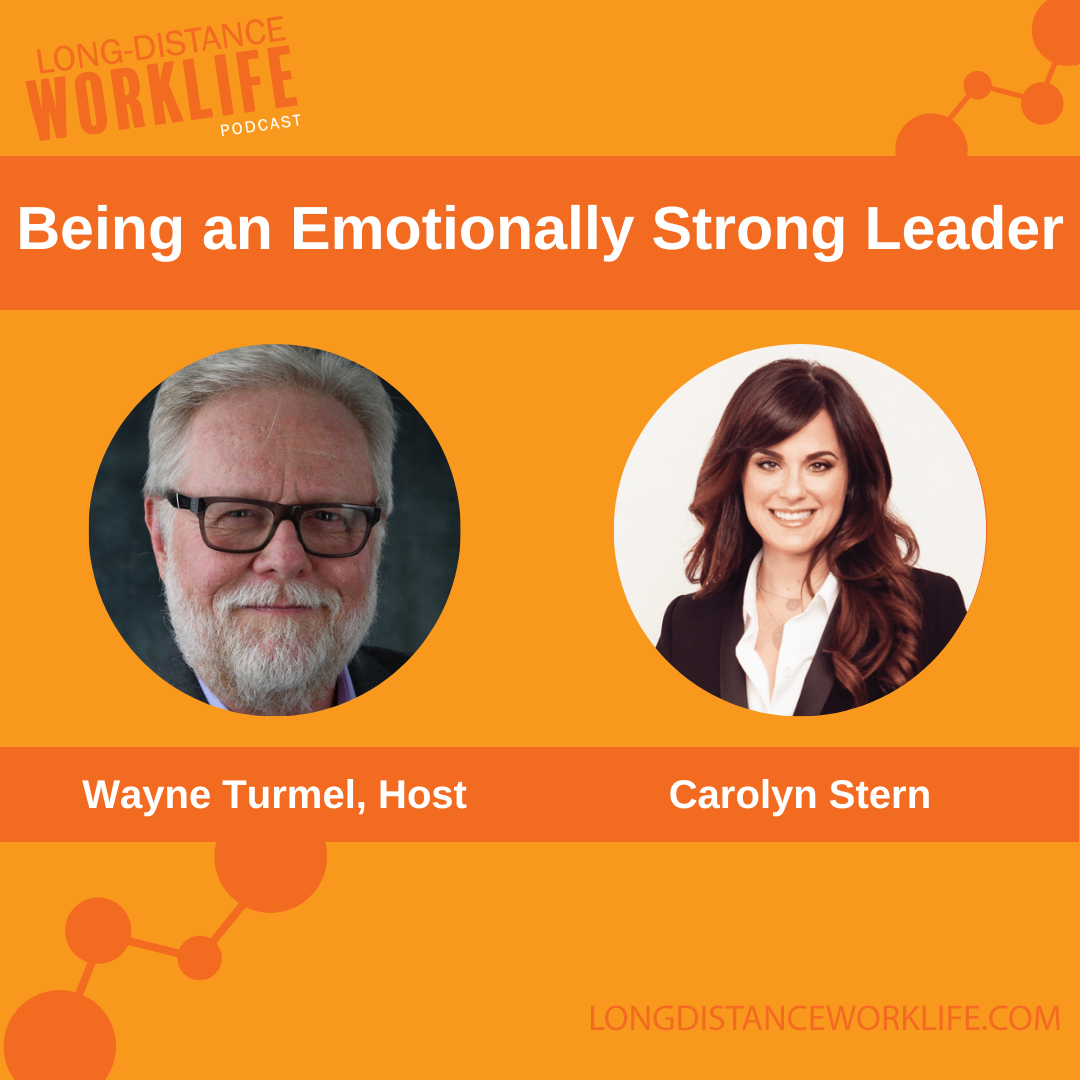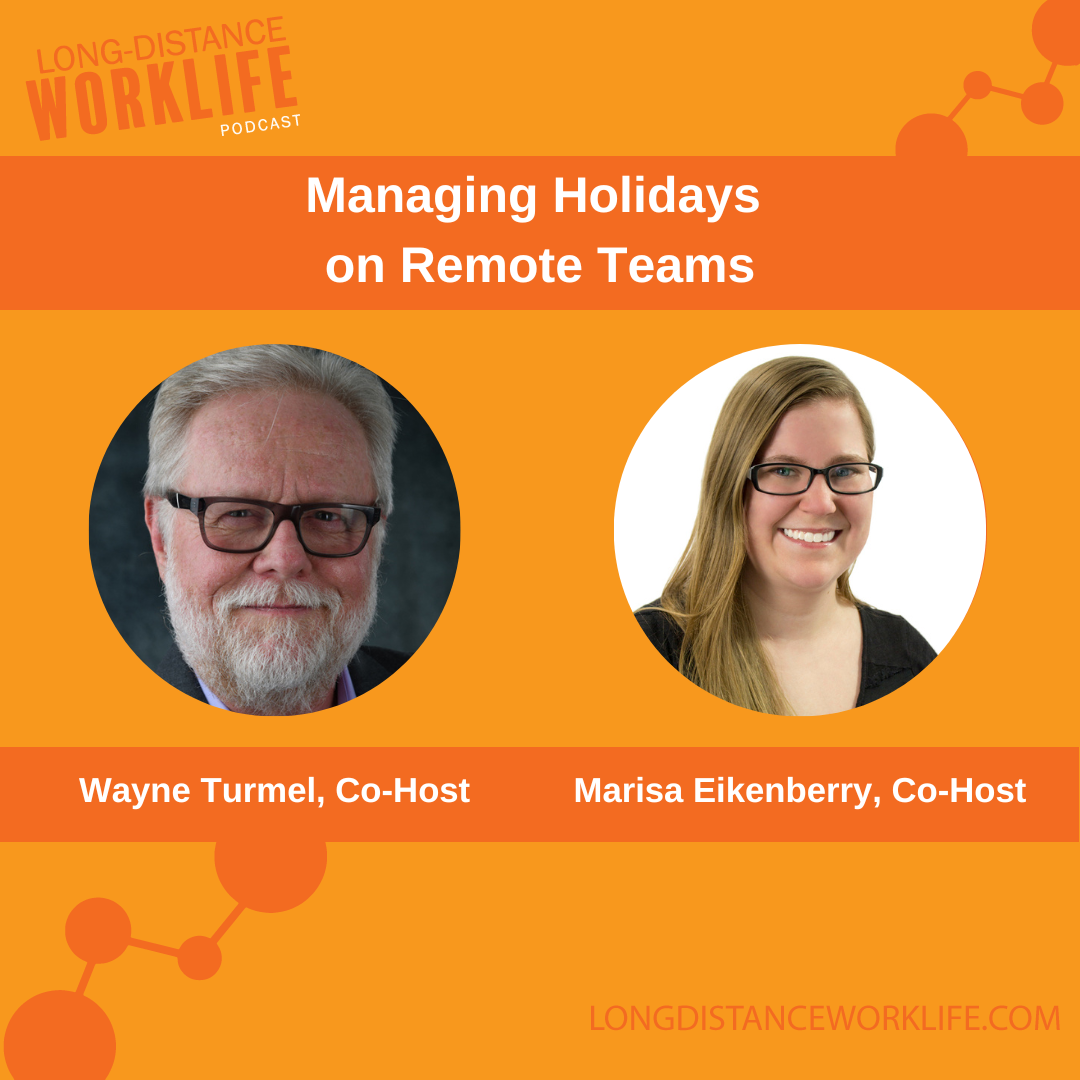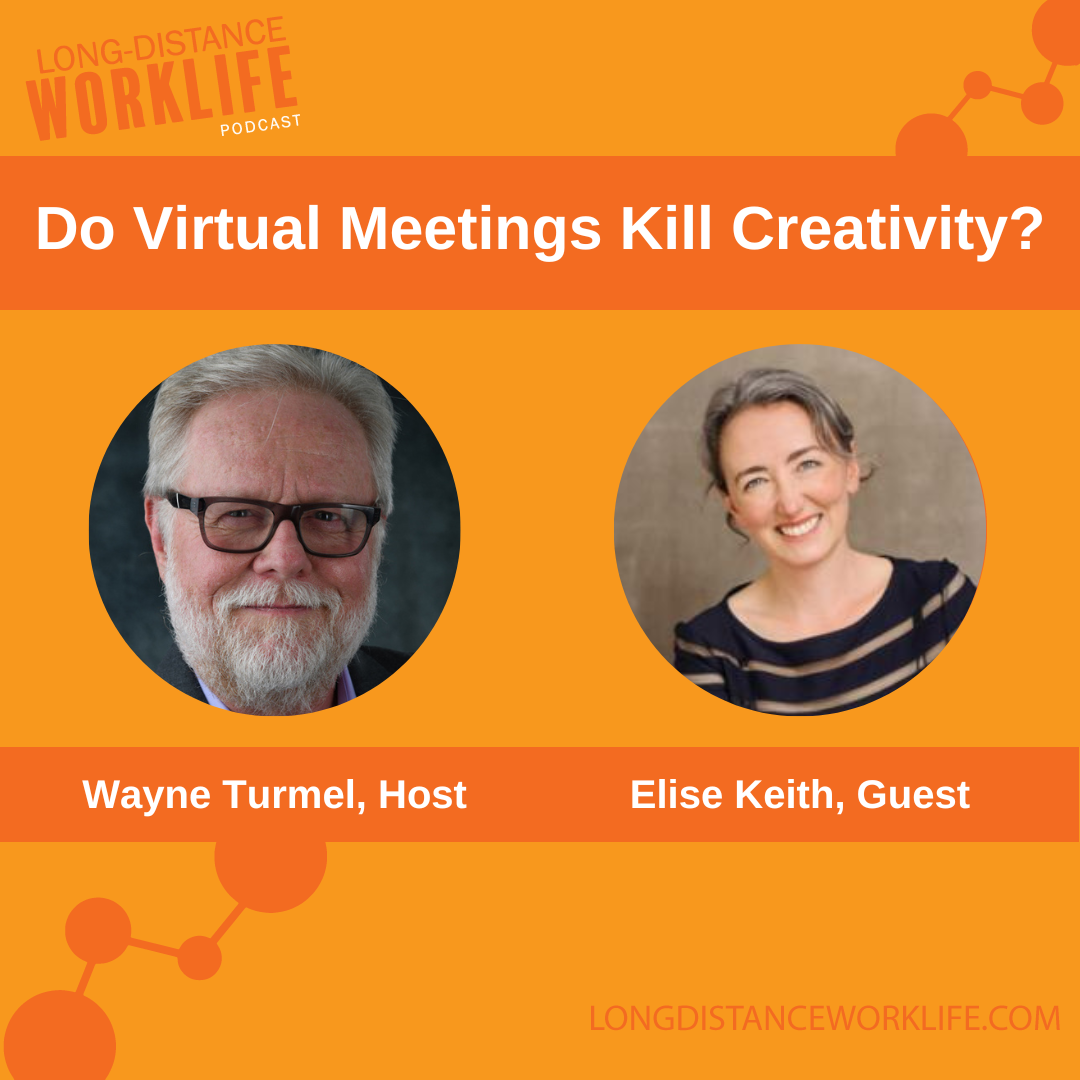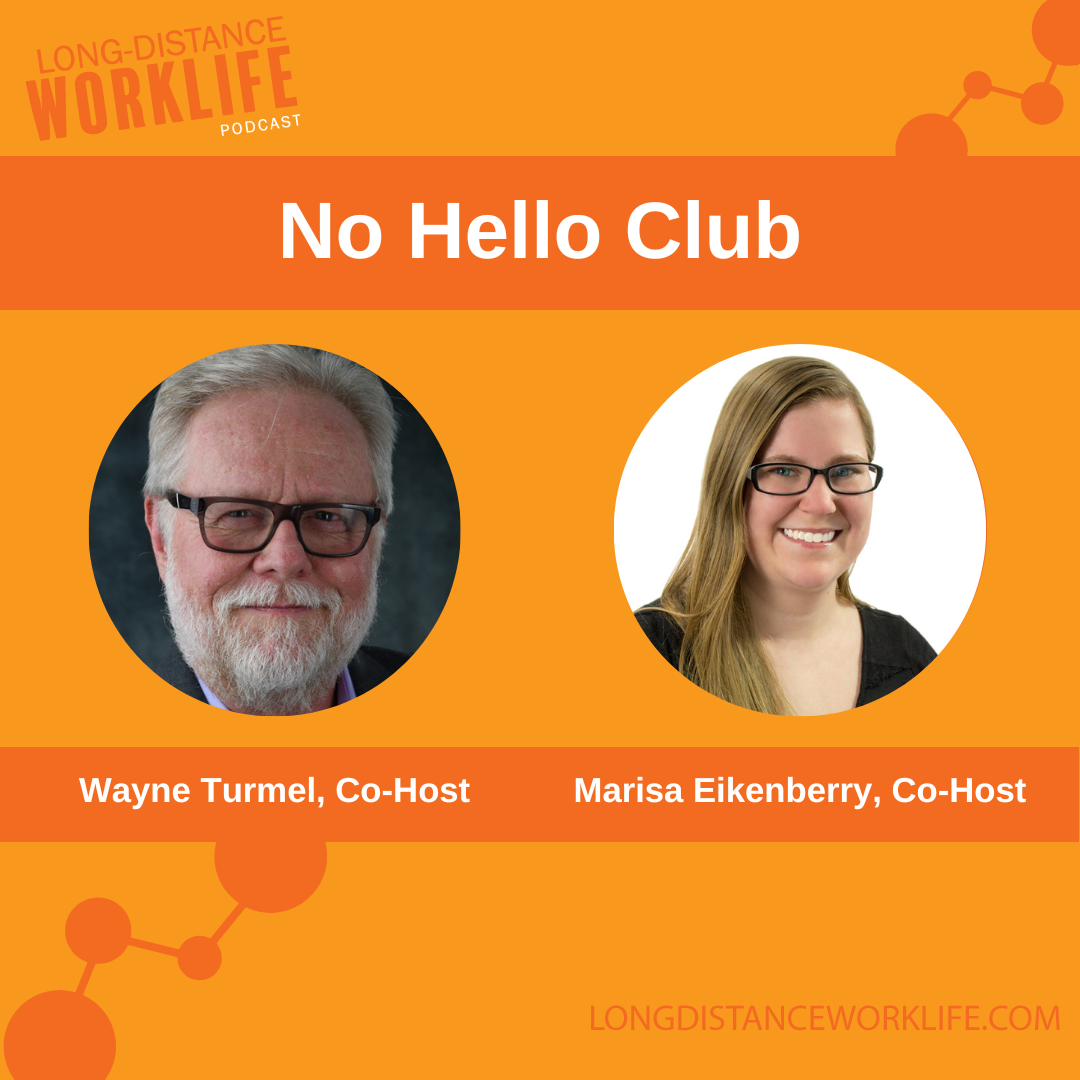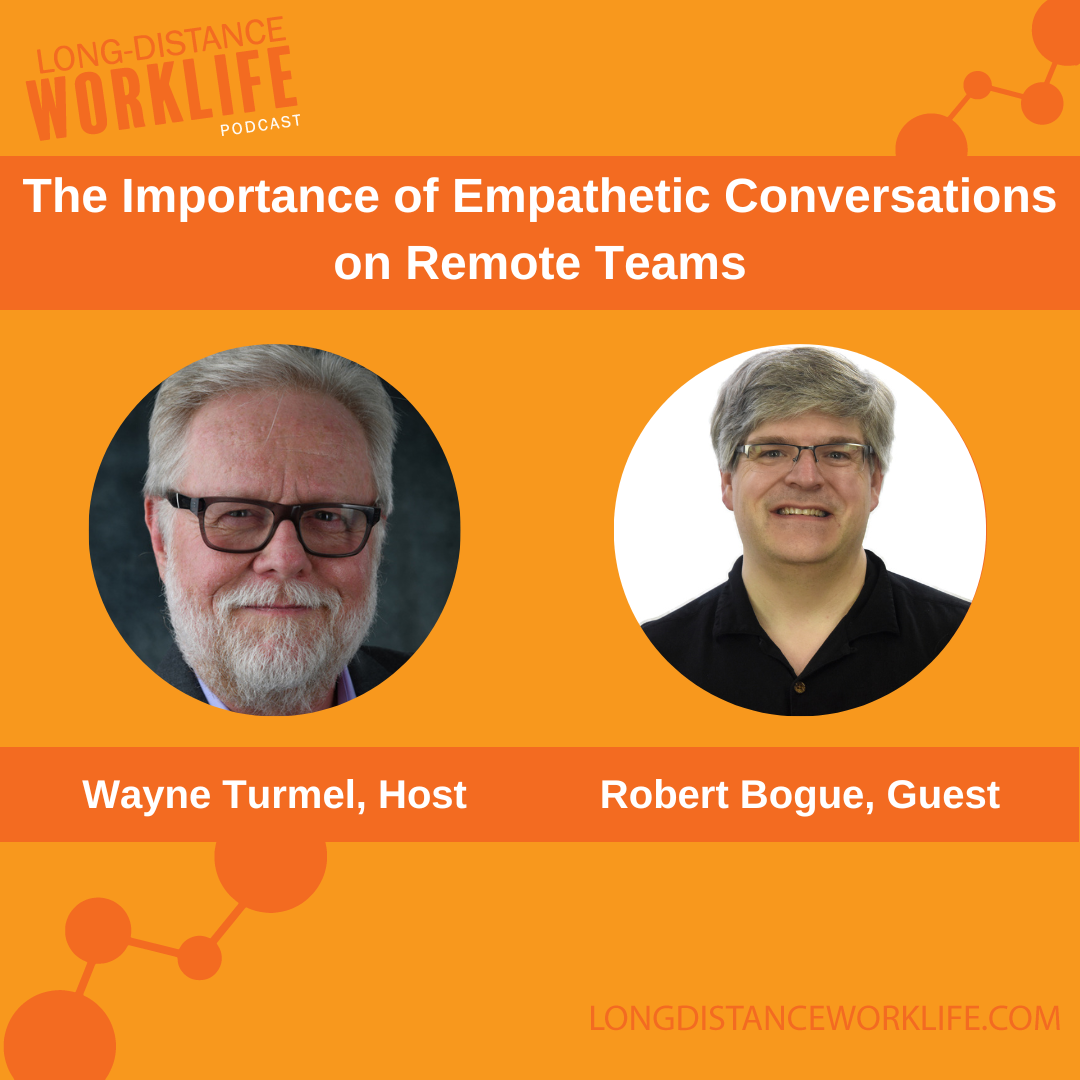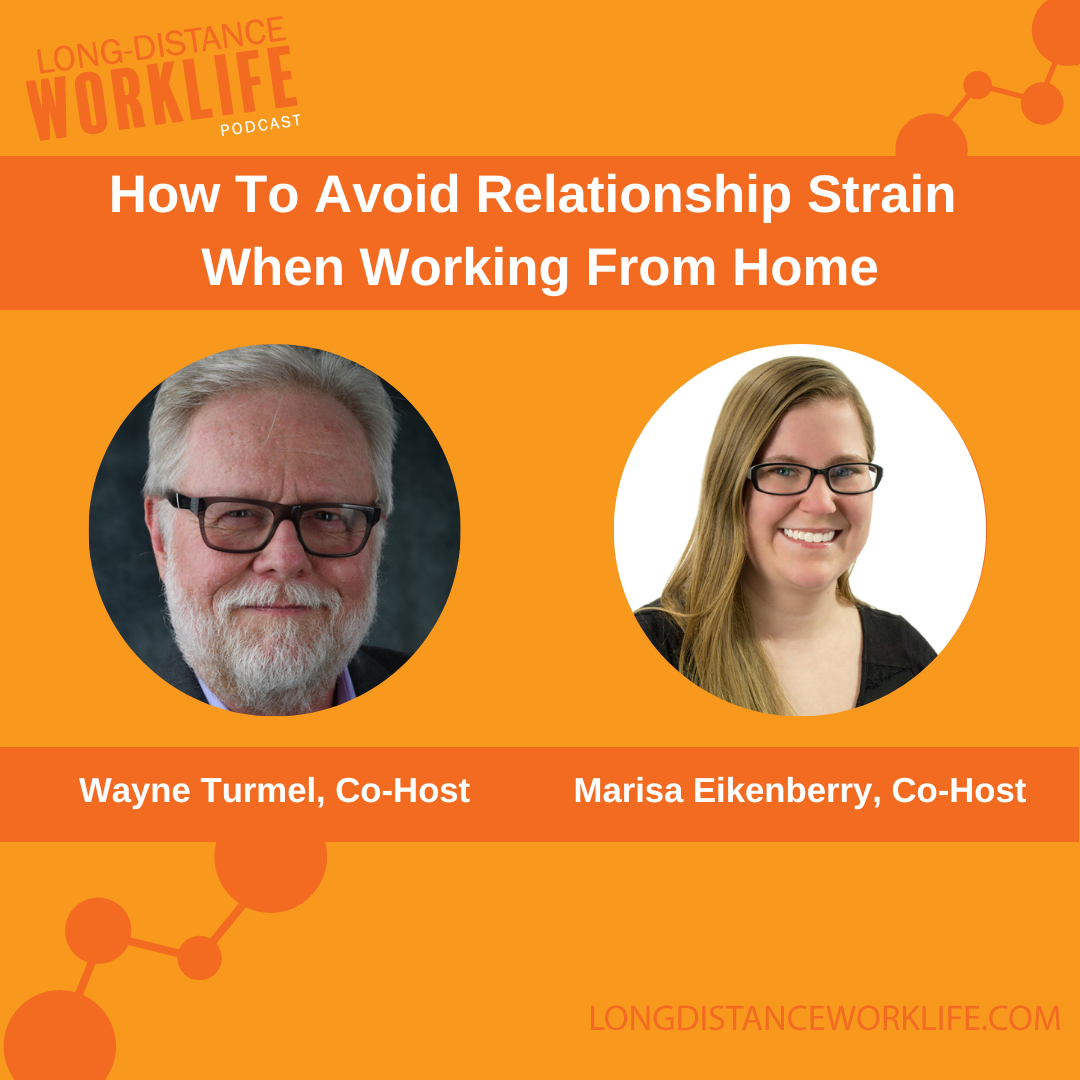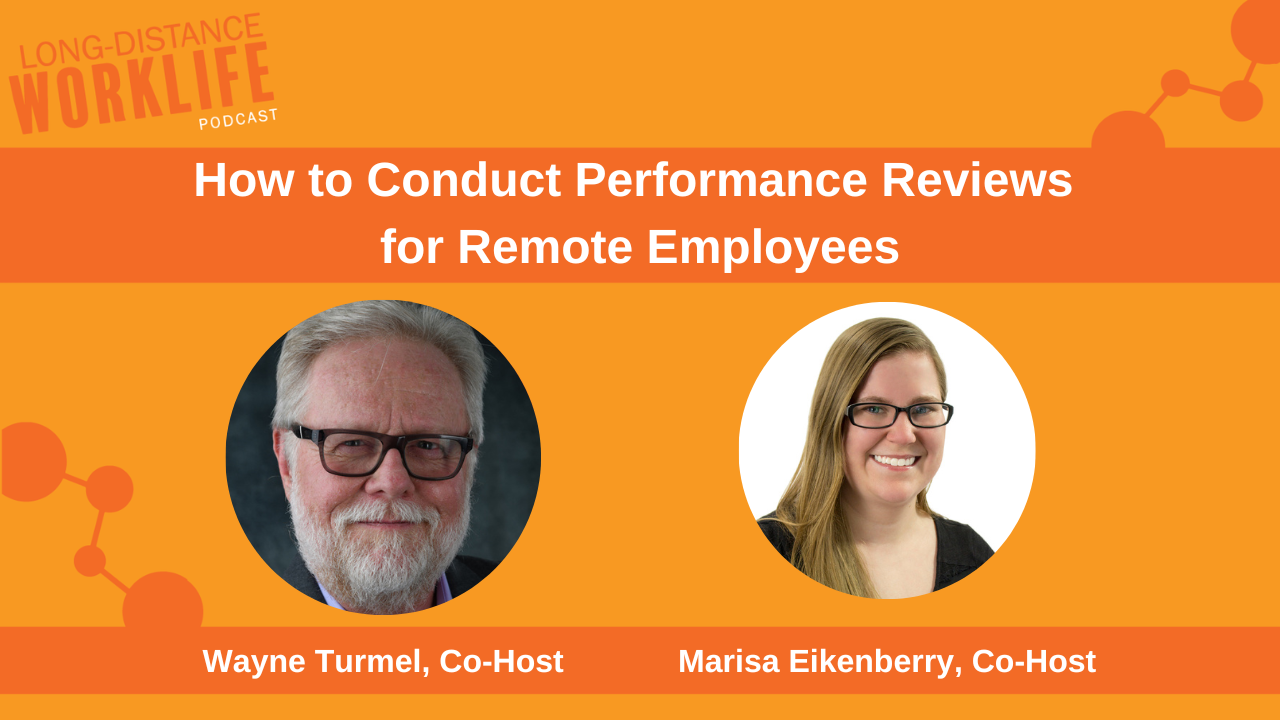Marisa and Wayne celebrate the 2nd anniversary of The Long-Distance Teammate by discussing the 3 P Model of Remote Work Success, the difference between team member and teammate, what it was like to write this book as remote work was becoming more prevalent in 2020, and what it was like to write a book about remote work remotely.
Key Points
- 00:42 - The 3 P Model of Remote Work Success
- 14:10 - The difference between Team Member and Teammate
- 15:40 - What it was like to write and edit this book at the start of the pandemic
- 18:45 - Writing this book remotely
Additional Resources
- To Raise Productivity, Let More Employees Work from Home - Harvard Business Review
- Learn more about Wayne Turmel
- Connect with Wayne Turmel on LinkedIn
- Learn more about Marisa Eikenberry
- Connect with Marisa Eikenberry on LinkedIn
- Purchase a copy of The Long-Distance Leader
- Purchase a copy of The Long-Distance Teammate
- Pre-order a copy of The Long-Distance Team
- The Kevin Eikenberry Group
Related Episodes
Pre-order The Long-Distance Team
Remote leadership experts, Kevin Eikenberry and Wayne Turmel, help leaders navigate the new world of remote and hybrid teams to design the culture they desire for their teams and organizations in their new book!

00:00:08:10 - 00:00:17:18
Marisa Eikenberry
Welcome back to Long-Distance Worklife. Where we help you lead, work, and thrive in remote and hybrid teams. I'm Marisa Eikenberry, a fellow remote worker. And joining me is my co-host and remote work expert, Wayne Turmel.
00:00:18:01 - 00:00:19:13
Wayne Turmel
And that would be me. Hi.
00:00:20:10 - 00:00:42:10
Marisa Eikenberry
Today we are celebrating the book The Long-Distance Teammate. We're celebrating the second anniversary. And so, yes, there's the book. For those of you watching us and I wanted to use this episode to ask some questions about the book and just more about this book that you've had for the last two years. So I do want to start with the very first chapter.
00:00:42:10 - 00:00:58:09
Marisa Eikenberry
One of the things that you talk about is the three piece model of remote work success. So for those who haven't read the book yet, this shows the three factors that impact the overall quality of remote work. So first off, can you explain this model for our listeners?
00:00:59:01 - 00:01:27:19
Wayne Turmel
Yeah. And I'm going to show it for those of you watching on YouTube or wherever, you'll be able to see this. The rest of you will just have to follow along. What happened is when we set out to write long distance teammate, the question we had was what makes a good teammate? So we surveyed hundreds of people and said, When you think of somebody as a good teammate, regardless of where they work, what does that person do?
00:01:27:20 - 00:01:59:08
Wayne Turmel
Right. Right. What makes that? And what I found is that there were three factors and in good fashion. We like alliteration around here and we like it simple. And we found three factors that made for a great teammate. And fortunately, they all were able to start with the letter piece and the three model. Right. Look how clever we are.
00:02:00:01 - 00:02:37:03
Wayne Turmel
Essentially, the three components are this. The first is productivity, which at first sounds like a big duh. I mean, that's kind of the entry level, right? If you're not hauling your weight, if you're not being productive, people probably don't look at you as a great teammate. Right. But when we talk about productivity, we're talking about out we're really talking about getting the work done, the right work in the right way, in the right amount of time and by the right work, that means not only your work, right?
00:02:37:05 - 00:03:03:14
Wayne Turmel
You got to get your work force, but you're helping the team. Right. So you're offering assistants, you're asking questions as you're stepping in when you have to. So productivity is kind of the basic version of a great teammate. The other two are proactivity and potential. Proactivity was by far the number one word that came up in the survey.
00:03:03:22 - 00:03:04:08
Marisa Eikenberry
Wow.
00:03:04:16 - 00:03:30:04
Wayne Turmel
Which is what does it mean to be proactive? On one level, it's all if something needs to be done, you do it without being asked. Yes, that's certainly part of it. But when we work apart from each other, there's a higher level of proactivity demanded. Do you reach out to somebody without being asked? Do you step up and volunteer for things?
00:03:30:05 - 00:03:46:05
Wayne Turmel
Do you speak up on meetings? You know, if you here's a big one and this is really important in hybrid work and remote work, which is when you have a question, do you ask it?
00:03:47:04 - 00:03:47:16
Marisa Eikenberry
Okay.
00:03:48:03 - 00:04:09:12
Wayne Turmel
Because so often when we work remotely, it's like, well, I'm not really sure, but I don't want to bother anybody. I don't know what Marissa's doing right now. And so I don't want to interrupt her or be a pain or look like I don't know what I'm doing. And therefore I'm just going to kind of keep digging until I put myself in a very deep hole.
00:04:09:19 - 00:04:14:17
Marisa Eikenberry
Yeah, it's so interesting the questions that we would normally ask if we were in the office, what would you. Yeah, we.
00:04:14:22 - 00:04:37:22
Wayne Turmel
Are much more comfortable asking them. And those include questions of our managers. Hey, you know, Kevin, you've given me three things to do. What's the priority? Right. Which order do you want them in? Right. Which is the kind of question that creates major heartburn when you're working remotely, because, you know, you get on a call and the boss says, hey, can you do this for me?
00:04:37:22 - 00:05:04:08
Wayne Turmel
And you go, Yeah, sure. And then you realize you don't have all the information you need or you've got, you know, timed challenges or something. And you do you step up and ask those questions. What great teammates are proactive. They will volunteer to help without being asked. They'll say, Hey, sounded like you were struggling a little bit. Do you need some help with that?
00:05:05:15 - 00:05:33:07
Wayne Turmel
And then the third piece is potential and is where you're taking the long view of things, not just for the team. Right. Why should I bother dealing with Marissa? You know, I can do this by myself or I don't have to include her in this. But if I do include her, she's going to learn a little bit more and she's going to feel more like part of the team.
00:05:33:07 - 00:05:52:17
Wayne Turmel
And there's a longer term value to involving Marissa in this particular conversation. It's also really, really hard to stay engaged over the long haul if you're not if there isn't a long term advantage to you.
00:05:53:04 - 00:05:54:03
Marisa Eikenberry
Right. That makes sense.
00:05:54:21 - 00:06:15:13
Wayne Turmel
So, you know, I can it feels very much on this show and any time you talk about leadership and teamwork, it always feels particularly for the manager, like you're giving and you're giving and you're giving and you're taking one for the team for a while. The tank runs dry, right? When you say, Why am I doing this right?
00:06:15:15 - 00:06:38:04
Wayne Turmel
Why am I taking let's take team communication. It can be very transactional. Why should I take the time to ask how you're doing and how your weekend was? Well, because we're going to build a relationship and we're going to like each other a little bit more. And if you like me, you're more liable to help me out and be proactive.
00:06:38:13 - 00:06:51:05
Marisa Eikenberry
Yeah. And Carolyn, you talked about this with Carolyn Stern about why we should be asking these personal questions and how the more engaged you are and the more we feel like human beings and not task completers like that's really important.
00:06:51:05 - 00:07:34:16
Wayne Turmel
And so yes, great teammates take one for the team on occasion. And we do give and we do go above and beyond. But there's a little bit of self-interest for us in that, of course, besides which, just it's more fun when you like, but you work with and the energy is high in those types of things. So the three P's are I think if I look at everything that's in the long distance team, mate, there are a couple of things, but the thing that resonates with our clients, the things when they say, Well, we're trying to build a culture or we're trying to build the team, or we wish people would work together better.
00:07:34:16 - 00:07:45:08
Wayne Turmel
Well, what does that mean? Right. Well, you've got three areas, right? Are they productive, really helping the team be productive? Are they proactive with each other?
00:07:45:16 - 00:07:46:00
Marisa Eikenberry
Right.
00:07:46:13 - 00:08:19:18
Wayne Turmel
And are they taking a kind of longer non transactional view of the work? And it's amazing how many people go, oh. Because a lot of people, individuals now really believe that as long as they do their work, that's what matters. And when we work remotely, it's really easy to go down the rabbit hole. You know, before the pandemic, when remote work was this lovely theory that we were all looking forward to someday.
00:08:20:19 - 00:08:23:09
Wayne Turmel
Harvard Business Review did a really famous study.
00:08:23:17 - 00:08:24:00
Marisa Eikenberry
Okay?
00:08:24:06 - 00:08:31:05
Wayne Turmel
And they said do. And the headline, of course, was People who work from home get more done.
00:08:32:05 - 00:08:32:14
Marisa Eikenberry
Okay.
00:08:32:22 - 00:08:52:22
Wayne Turmel
That was the headline. Like all studies, of course, it went much deeper than that, of course. But the fact of the matter, if you judge productivity, for example, by task completion. Yes, you will probably if you are trying at all, probably going to achieve more working from home than you do in the office.
00:08:53:01 - 00:08:53:09
Marisa Eikenberry
Right.
00:08:53:09 - 00:09:22:13
Wayne Turmel
Because some people aren't stopping by your desk and there's no birthday cake in the break room. And, you know, all of that stuff. But when we looked at productivity from a team perspective, like people who work from home can tend to become very focused on their own tasks at the expense of the team. They don't participate as much in meetings.
00:09:22:13 - 00:09:29:16
Wayne Turmel
They maybe don't confer with each other as often as they might. They not that they can't. Not, of.
00:09:29:16 - 00:09:30:02
Marisa Eikenberry
Course.
00:09:30:05 - 00:09:34:12
Wayne Turmel
Don't just sometimes that tendency exists.
00:09:34:12 - 00:09:36:04
Marisa Eikenberry
We get a little siloed. I understand.
00:09:36:10 - 00:09:42:19
Wayne Turmel
And and and there are days when you want. I got stuff to do. Leave me alone. Right.
00:09:44:09 - 00:09:45:17
Marisa Eikenberry
Do not disturb on and we're done.
00:09:46:00 - 00:10:19:15
Wayne Turmel
But if the team is going to succeed and it particularly in a hybrid environment where it's not all a series of individual contributors working on their own work, we need to be cognizant of how do we get that team esprit de corps, that morale and we do that by looking at the make up a great teammate. Right. Are folks productive or are they proactive and are they taking a long term potential view of of their work?
00:10:19:15 - 00:10:30:05
Wayne Turmel
And so I think if I look at the book, it's one of the things I'm most proud of is having that model so that people get it.
00:10:30:23 - 00:10:45:01
Marisa Eikenberry
Yeah. So with that, you know, I mean, this book has been out for a couple of years. How have you seen organizations use this model effectively within their remote teams? I mean, is it really just you talking to them and them going, Oh, hey, I'm not sure that these things are equal.
00:10:45:19 - 00:11:12:05
Wayne Turmel
I think I mean, of course, we in them, we do training in a number of different ways and we use this model in a number of different ways. But I think what a lot of organizations have realized is that when, you know, the diaspora hit and everybody started working from home, there was a lot of work done on how do I manage remotely, right?
00:11:12:19 - 00:11:28:10
Wayne Turmel
I used to have my team all here and now I don't, and rightly so. I mean, leadership training is critical to a good team, but they also realized that they hadn't done a lot to help support the individual.
00:11:29:01 - 00:11:31:13
Marisa Eikenberry
Okay.
00:11:31:13 - 00:12:02:05
Wayne Turmel
You know, other than here are some tips for getting your work done because that's all that's important to us kind of thing. Yeah, but really, people were complaining, you know, I don't enjoy my work as much as I did when I was in the office or I don't have the same relationship with my teammates. And so the model has really helped people go, Aha, we need to create opportunities for our team members to interact.
00:12:02:09 - 00:12:27:19
Wayne Turmel
We need to create opportunities where Marissa is really, really smart about this and Bob needs some help there. Well, Bob's in the office. Marissa is not. But maybe if we intentionally connect Bob and Marissa not only does Bob get what he needs, but it's creating a bond that might not otherwise be there if they didn't share a workspace.
00:12:28:00 - 00:12:29:12
Marisa Eikenberry
Yeah, that absolutely makes sense.
00:12:30:07 - 00:12:52:03
Wayne Turmel
And so as with any good model, and I think Kevin and I have done a good job in the three longest science workplace books of creating very simple conversations, starting models that have long reaching effects if you start to dig into them.
00:12:52:10 - 00:12:52:19
Marisa Eikenberry
Yes.
00:12:53:20 - 00:13:23:01
Wayne Turmel
Right. And I think that's the three P model. I think that's what that does. I mean, the long distance teammate was different in that it was aimed at the individual contributor knowing full well that members are also individual contributors on their teams with their colleagues. Right. Right. Yes. I'm the boss of this. But guess what? All the other regional managers are on a team, right.
00:13:23:11 - 00:13:26:18
Wayne Turmel
Right. And they have a one of those guys.
00:13:26:18 - 00:13:29:23
Marisa Eikenberry
Yeah, absolutely.
00:13:30:15 - 00:13:40:11
Wayne Turmel
And so that's what I think makes a long distance team mate different. There were books on the market about getting work done and being active.
00:13:40:21 - 00:13:41:05
Marisa Eikenberry
Mm hmm.
00:13:41:22 - 00:13:58:13
Wayne Turmel
And there were books about leading teams, but not on what's my role on the team. Right. And we were very Kevin and I went round and round, and this is one of the few discussions with Kevin. I actually he won.
00:13:59:22 - 00:14:00:13
Marisa Eikenberry
Okay.
00:14:00:17 - 00:14:02:03
Wayne Turmel
So I take great pride in that.
00:14:02:03 - 00:14:04:10
Marisa Eikenberry
Absolutely. Where's the job? Right.
00:14:06:02 - 00:14:08:11
Wayne Turmel
We started talking about team members.
00:14:08:23 - 00:14:09:08
Marisa Eikenberry
Okay.
00:14:10:05 - 00:14:36:13
Wayne Turmel
And everything was the team member. And then we realized that there's a difference between somebody who's just a member of the team. Mm hmm. And somebody who people consider to be a great teammate. Okay. And just like we aspire to be, not just bosses, but remarkable leaders. I don't want to just be a member of the team. I want people to think of me as a teammate.
00:14:37:09 - 00:14:39:18
Marisa Eikenberry
That's a huge distinction. I hadn't thought about that before.
00:14:40:08 - 00:15:05:10
Wayne Turmel
Because you can be especially on teams full of individual contributors. You can be a perfectly productive member of the team. You get your work done. If somebody asks you to respond, you know, but people don't think of you. There's an emotional component to being to the word team mate that is different than just being another guy that answers to the same boss.
00:15:06:04 - 00:15:10:10
Marisa Eikenberry
Yeah. So I guess all of us need to ask ourselves, like, are we a team member or a team mate?
00:15:11:17 - 00:15:27:10
Wayne Turmel
And that's the focus of this book. And I still don't think there's anything exactly like it. But certainly when this came out and the timing was what it was, certainly nobody else was having this conversation with readers.
00:15:27:17 - 00:15:46:08
Marisa Eikenberry
Right. Well, and given that, too, so, you know, you've started writing this book and what we have called on this podcast before the before times. And, you know, so right is, you know, a third of the workforce was beginning to work remotely. So what was it like to write a book that was so relevant to a topic that was currently spreading through the world?
00:15:47:16 - 00:16:19:16
Wayne Turmel
In some ways it was a little frustrating because the publishing cycle in and nobody cares about this is inside baseball. But the publishing cycle, it can take over a year from the time a book has finished until the time it comes out into the world. Well, by the time we finished the first draft, we finished the first draft January of 2020, and then we had to do the second round of edits come March and April.
00:16:19:16 - 00:16:41:15
Wayne Turmel
Well, March and April. All of a sudden we were in the depths of the first wave of the pandemic. Yeah. And so we had to look at the book and go, do we need to change and tweak certain things? Right. And what we found, blessedly, is not a lot.
00:16:42:03 - 00:16:42:17
Marisa Eikenberry
That's awesome.
00:16:43:23 - 00:17:19:12
Wayne Turmel
We had I mean, we have an advantage in that we have been teaching leadership and I had had an expertize in the kind of remote and virtual piece for several years before things got critical. Right. And so we were already having these conversations and already talking to people about them. And the analogy I was using, I felt a little bit like the guy with the sandwich board standing there saying the end is nigh and now I just have a new sandwich board that said, told you.
00:17:19:18 - 00:17:20:04
Marisa Eikenberry
Right.
00:17:21:21 - 00:18:00:10
Wayne Turmel
But the timing was both fortuitous. And I think it speaks to the fact that Kevin and I and the cagey group are always trying to look at what's next. We're not just resting on Here's what we know work. It's what's going on in the workplace that's going to impact that. That's what we do right pretty well. I mean, the same was true when long distance leader came out and with our new book coming out, The Long Distance Team, it's very focused on culture and team formation.
00:18:00:11 - 00:18:20:08
Wayne Turmel
And as we're looking at return to office, that's all our clients are talking about. So again, the timing is really good. You know, in a selfish world, we have like to have it out six months ago. Yeah, the answer is sure we would. But that's the way the book industry works.
00:18:20:11 - 00:18:20:19
Marisa Eikenberry
Right?
00:18:20:20 - 00:18:32:20
Wayne Turmel
But we've been very lucky with the timing as well as just very deliberate in what we do. And opportunity has kind of met preparation.
00:18:33:09 - 00:18:52:10
Marisa Eikenberry
Right. Absolutely. Well, and one of the other things, because I know that, you know, we're we're running over time here, and I had a lot more questions that we're not going to get to, and that's okay. But one of the things that because, you know, inside baseball, whenever like you're in Vegas, Kevin is in Indianapolis, like this book was largely written remotely.
00:18:52:10 - 00:18:55:14
Marisa Eikenberry
I don't think you guys got together in person for this one.
00:18:55:15 - 00:19:49:20
Wayne Turmel
We did not physically get together. I think we were together in Chicago for an evening at a client event and we were starting to at the book. But I think when people say, can you collaborate and can you do good work and can you do innovative work? I kind of go, yes, apparently it can be done. But then you realize that I have worked for Kevin for almost seven years now and we have never been in the same place at the same time, more than four times a year ever in the time that we've worked together, and certainly in the pandemic kind of main body of that, we didn't, but we work together really well
00:19:49:20 - 00:20:04:05
Wayne Turmel
and we use our webcams and we collaborate effectively and all of that stuff. And frankly, if you know anything about the co-writing process not being within physical grabbing distance of each other was probably a blessing in its own way.
00:20:05:05 - 00:20:21:06
Marisa Eikenberry
Probably in many ways. You know, I know that there are obviously a lot of questions I didn't ask that I'm just not going to get to because we're running out of time. But is there anything that I didn't ask that you wish that I would have had time for? Maybe we can answer that before we close.
00:20:22:03 - 00:20:45:09
Wayne Turmel
I think I said that there were a couple of concepts in the book. The big one is the three P's, but there's another one this concept of ethical visibility. And I think and dear listener, you know, stick around because I think it deserves its own episode. And so we're going to do, I think, just an episode on that concept.
00:20:45:19 - 00:21:03:17
Wayne Turmel
And I think that's important. The big thing I think that I want people to take away is long distance leader was aimed at those with the capital L leader title. Right. I am a manager. I am a boss.
00:21:04:09 - 00:21:05:15
Marisa Eikenberry
They've got the name on the door.
00:21:05:20 - 00:21:24:04
Wayne Turmel
I've got the name on the door exactly right. But they're the inmates who think of themselves as leaders. There are people that people follow, whether they have positional authority or not. And that's who long distance team mate is for. It's for those people.
00:21:24:18 - 00:21:43:00
Marisa Eikenberry
I love that. I love that. Thank you so much for listening to the long distance work life for Shownotes transcripts and other resources. Make sure to visit long distance work life XCOM if you haven't yet, subscribe to the podcast, you won't miss any future episodes and while you're there, be sure to like in review. That's helps our show reach more teammates and leaders just like you.
00:21:43:10 - 00:22:02:02
Marisa Eikenberry
Feel free to contact us. Feel email or LinkedIn with the links in our show notes and let us know you listen to this episode or even suggest a topic for Wayne and I to tackle in future episodes. And if you'd like to learn more about remote teams, preorder Waiting Kevin's new book, The Long Distance Team. You can learn more about the book and long distance work like that for last year.
00:22:02:15 - 00:22:07:12
Marisa Eikenberry
Thanks for joining us. And as Wayne likes to say, we have to denounce.

